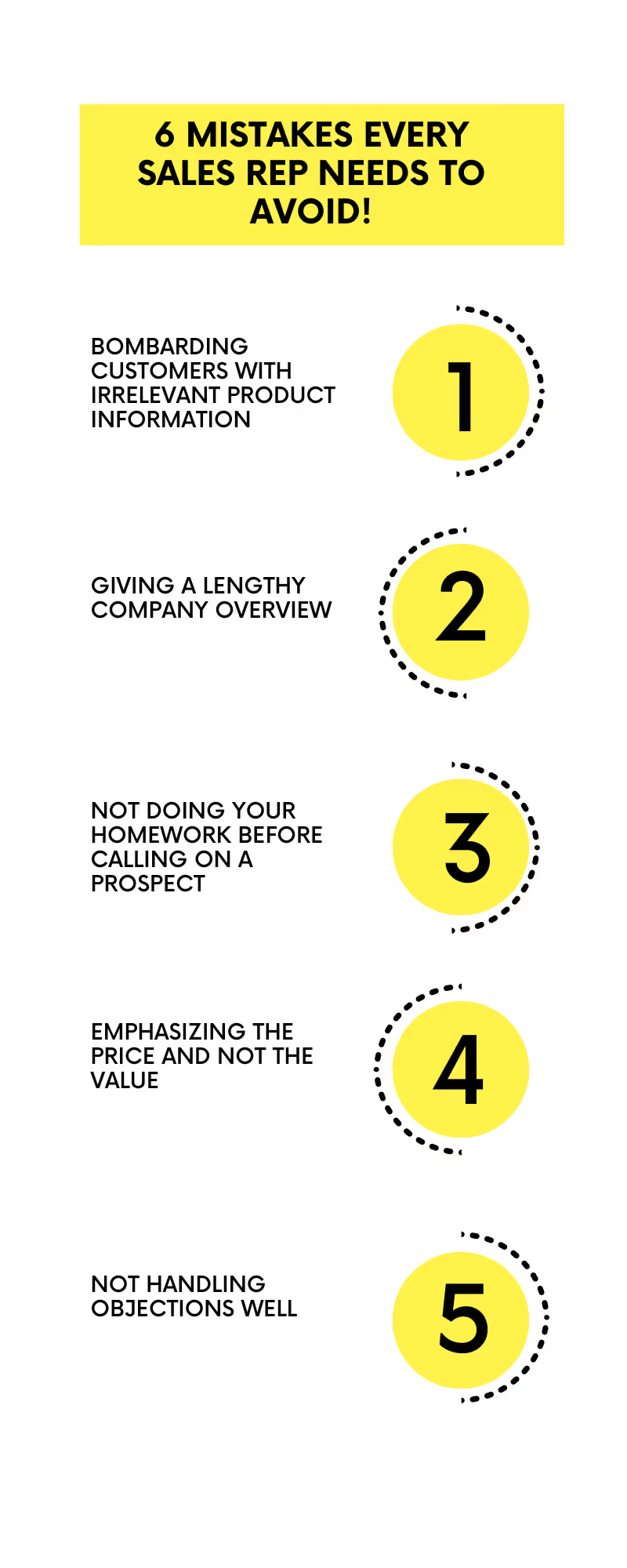
Blog
6 Mistakes Every Sales Rep Needs to Avoid!
August 30, 2022


Key Insights
Salespeople are the ones who play an integral part in a company-customer relationship.
Through them, a company can understand their needs and provide them with the most suitable product or solution. It takes both talent and experience to be a great salesperson.
To ensure that your business gets strategic success without having to struggle, here are the common mistakes that your sales team needs to avoid:

Bombarding customers with irrelevant product information
The last thing customers want to do is be bombarded with irrelevant product information. When you try to make every single customer interaction just a little bit more aggressive and a little bit more sales-y, you're going to get pushback.
That's because your customers don't want to be sold. They want to feel as though they are being taken care of by someone who cares about them and their concerns.
In order for you or your team to create the best experience for your customers, it's important that you focus on the best way to gain their trust. If you're going above and beyond in this area, you'll find that your customers will eventually turn into loyal advocates for your brand and your products. And when that happens, sales are inevitable!
Giving a lengthy company overview
We've all seen the leader of a company or team go through an incredibly long and detailed introduction before a presentation. It's something that I'll admit to having done as well—it's easy to get caught up in your accomplishments and want to show off, but you're only hurting your own case by giving a lengthy, self-congratulatory overview.
Not only does it take away from the time for the important parts of the presentation, but it also makes the presenter seem like they're full of themselves.
The main focus of your team should be on what you're going to say next, not how great or successful you are as a person or organization. This is especially true if you're using this time to try and sell your audience on something—your time would be better spent including actual details about whatever it is you're trying to sell them on (in this case, your product).
People don't want to be sold, they want to be shown why they should buy.
Not Doing Your Homework Before Calling on a Prospect

this one is a classic, and for good reason. Sales professionals around the country agree that if you haven't done your research on a prospect before reaching out to them, you're making an already challenging task even harder. Make sure you have all of the pertinent information about your prospect—their name, title, contact info, recent news about them, etc.—before calling them for the first time.
It's also important to have an understanding of what makes this particular prospect tick—what do they value?
What's their pain point? How could you be valuable to them? This will help you tailor your pitch and plan your call accordingly.
Emphasizing the price and not the value
Approach every sales opportunity with a friendly, constructive attitude. While it's true that price is a powerful negotiating tool in getting deals done, emphasizing the price at the expense of value will do more harm than good and might make you seem like you're trying too hard to sell a product.
Not handling Objections well
The sales cycle can be a brutal process. It's easy to feel like you're up against a brick wall when potential customers flat out refuse to even consider your product or service. When objections start piling up, you might feel like you've lost control of the conversation and start second-guessing yourself.
While it's important to stay calm and collected, there are ways to turn the tables on your prospect and get them on your side.
- The first step is to understand that almost everyone has objections in the sales cycle; your prospect is likely not one of the dreaded "closers" who makes the process seem so difficult.
- Think of your sales process as a funnel: at the top, you have a ton of prospects who might never end up being clients. As you move through each stage of the sales cycle, fewer prospects remain until, hopefully, you have a few clients at the bottom who will buy from you every month! In between those stages, most people will have some kind of objection that stops them from buying.

Identify common objections: Your first step should be to understand what these objections
Not listening and talking too much
When you're in a sales call, there are times when it's appropriate to listen and times when it's appropriate to talk.
Although your advice might be incredibly valuable, it can be hard to get your point across if the prospect is doing all the talking. And if you're not listening to what they are saying, you might miss an opportunity.
If it's a quick meeting, make sure you capture everything that is said during the call so that you can follow up with them. Also make sure to ask them what they like about your product or service. The key is to always try to be prepared before the meeting and use your time wisely. It also helps if you have a list of questions you want answered by the prospect so that you don't waste your time trying to "figure them out".
Conclusion
When you're on top of things, sales success is a sure thing. You can't afford to let any of the following mistakes happen—to you or to your reps who are out there making sales every day.
Measure your team's performance with these six benchmarks, and make sure you always know exactly how well (or how poorly) your team is doing.
ReKennect : Stay ahead of the curve!
Subscribe to our bi-weekly newsletter packed with latest trends and insights on incentives.
Thank you! Your submission has been received!
Oops! Something went wrong while submitting the form.
Your data is in safe hands. Check out our Privacy policy for more info








%20(1).avif)







